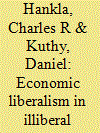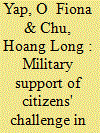| Srl | Item |
| 1 |
ID:
123620


|
|
|
|
|
| Publication |
2013.
|
| Summary/Abstract |
Over the last few decades, a vast literature has emerged examining the relationship between democratic political institutions and trade policy outcomes. While this literature has added significantly to our knowledge, it has effectively ignored policymaking in dozens of important states-those that remain autocratic. This paper fills that hole by exploring the effects of authoritarian variation on national trade policies. Our contention is that more institutionalized authoritarian regimes will tend to adopt more open trade policies. This relationship should hold, we argue, for two distinct reasons. First, we argue that autocratic regimes with larger "selectorates" should have greater incentives to provide public rather than private goods. As a result, we expect that multiparty, and to a lesser extent single-party, autocracies will tend to prefer more open trade policies than non-party (often personalistic) dictatorships, monarchies, and military juntas. Second, we contend that more stable autocratic regimes will have longer time horizons and therefore greater incentives to adopt policies, such as trade openness, that may strengthen long-run economic performance. We find strong support for these arguments using several cross-national time-series models of all autocracies ranging from 1962 to 2007 (contingent on data availability).
|
|
|
|
|
|
|
|
|
|
|
|
|
|
|
|
| 2 |
ID:
142076


|
|
|
|
|
| Summary/Abstract |
When do militaries in the newly industrialized countries of East and Southeast Asia support their governments, when do they support citizens' challenge of government, and when do they launch coups? We propose and test a theory of military behavior using data from across East and Southeast Asia between the 1970s and 2008. The results corroborate the model's predictions to make four contributions: First, the model provides a framework of military behavior for countries to expand study beyond coups or the absence thereof. Second, the findings bring to focus the influence of citizens on the military's behavior, an aspect largely overlooked in scholarship of the region. Third, the necessary conditions—weak economy and galvanized citizens' challenge— that affect the military's behavior vis-à-vis citizens and the government highlight the strategic interaction treatment. Fourth, this study broadens systematic treatment to enrich empirics and theory-building for the political economies of these countries.
|
|
|
|
|
|
|
|
|
|
|
|
|
|
|
|